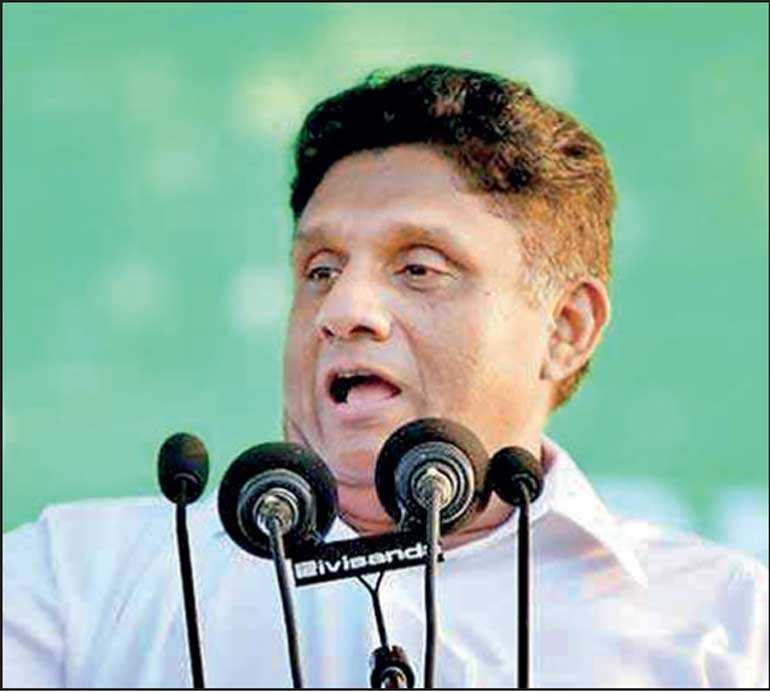Monday Feb 16, 2026
Monday Feb 16, 2026
Wednesday, 2 October 2019 00:00 - - {{hitsCtrl.values.hits}}

United National Party (UNP) presidential candidate Sajith Premadasa yesterday outlined plans to invest in Sri Lanka's human capital by reforming pre-school education, addressing child and infant malnutrition, and strengthening care for the elderly, if elected.
Premadasa made the policy statements at a press conference, flanked by Justice Minister Thalatha Athukorale and Colombo Mayor Rosy Senanayake.
He pledged to commission improved national strategies addressing these three key social issues, which he stated will be overseen by Presidential Task Forces, which will work out of the Presidential Secretariat. The Minister claimed that the policies will be implemented to a “time-targeted program”, which will be transparent to the public.
Premadasa argued that the preschool education sector played a vital part in a person’s development, and affects the future human resources capacity of the island, stating that out of 19,000 current institutions, only around 10,000 were registered with the Government. He pledged to make preschool education free of charge and accessible to all, through State regulation and State patronage. “The children can't speak up for themselves, therefore the needs to proactively ensure that the human rights of the children and of the elderly are not violated and are sustained," he opined. The State has a special responsibility to address these issues and ensure the rights and nutrition of these vulnerable communities are met, he stated.
Preschool education should be delivered free of charge to everyone, in line with the country’s free education policies and through a national curriculum, he said. Under the proposed reforms, preschools will be staffed by qualified teachers on a government payroll. Responding to a question on the fate of the 9000 unregistered schools, he said that such institutions will be gradually regulated, becoming part of the wider network, and not be shutdown. The proposed preschool education reforms will be complimented by a national strategy on child nutrition, he said. The presidential hopeful pointed out that malnutrition in Sri Lanka leads to dwarfing, low birth-weight babies, stunting, anaemia, and other deficiencies, which negatively affect child development in the crucial early years.
The presidential hopeful also said he supports stricter penalties for those who engage in child abuse and paedophilia, pointing out that legal protections offered to children need to be better implemented. Commenting on the topic, Justice Minister Atukorale said that the goal was to set up at least one children's court per province in the near future. She also said that the Education Ministry was making plans to introduce basic knowledge on the law at school level.
According to Premadasa, about 70% to 80% of human brain development takes place from birth to the age of five. Thus, it is essential to eliminate child malnutrition as soon as possible, he said, pointing out that failing to do so would have a negative effect on future production efficiency.
The proposed nutrition policy will be implemented across some 14,022 Grama Niladhari Divisions island-wide. The Minister noted that the Grama Niladhari-level grassroots healthcare and nutrition centres need to revived and modernised to deliver better services. Rosy Senanayake pointed out that children in the estate community, and some parts of the North and North Eastern regions, were vulnerable to malnutrition and other deficiencies. Premadasa, pointing to the prediction that Sri Lanka's elderly population will double by 2050, said action was needed now to prepare for the future. He cited statistics from 2012, which had put the figure at 12.4%. The Minister said that there was a need for a social security net for the elderly, and one of the Presidential Task Forces will oversee his proposed policy on the matter if he is elected. "Right now, we live in a society where some of them are compelled to move to a home for the aged. Whether or not this is in line with our family values is a question we as a society must ask ourselves,” he said, pointing for the need for a broad public discussion on the issue. However, he stated that the State held some of the responsibility to act to ensure the safety and nutrition of the elderly.